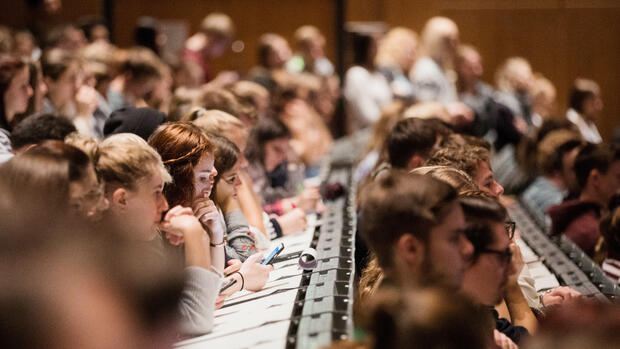German universities had to spend significantly more on energy during the winter.
(Photo: dpa)
Berlin The drastically increased energy prices have also increased the costs of the universities: During the past winter, German universities and technical colleges spent an additional 347 euros per student on energy, according to a survey of the Stifterverband among universities. According to the estimate based on this, the extra costs add up to around 1.3 billion euros.
Overall, energy costs in 2022 were around 14 percent higher than in the previous year, according to the latest university barometer from the Stifterverband and Heinz Nixdorf Foundation.
The consequences were not only shorter opening times, for example in libraries, and generally lower temperatures in lectures and laboratories. The high energy prices are also slowing down research: 13 percent of the universities stated that they had already reduced the use of energy-intensive infrastructures in research. Even one in five universities did this.
If energy prices remain significantly higher than before the start of the Ukraine war, half of the universities would save primarily on infrastructure, for example in libraries or in IT – but more than a third also on research infrastructure.
The Stifterverband therefore warns of negative consequences for innovations and research from Germany. The General Secretary of the Stifterverband, Volker Meyer-Guckel, therefore demands: “Even energy-intensive research, such as in chemistry, and the further digitization of universities must not suffer from the high energy costs.”
Universities could be pioneers in climate neutrality
At the same time, the Stifterverband, which bundles business activities for science and is financed by its member companies, also sees opportunities: Universities should be “experimental spaces for the energy transition” and “play a pioneering role on the way to the climate-neutral building stock” of the state, believes Meyer-Guckel.
>> Read more: Germany cannot afford to lose any more when it comes to innovations
After all, according to the federal government’s energy efficiency strategy, the building stock in Germany should be largely climate-neutral by 2050 – including state real estate.
The survey found that universities already produce about six percent of the energy they need themselves. Also because they have massively expanded the courses in sustainability in recent years and some of them have been tried out directly in their own buildings. In order to strengthen the universities on this path, investments and funding programs are needed, says Meyer-Guckel.
Many countries only cover part of the extra costs for energy
Instead, many are currently worried about the funds for next winter. At the time of the survey at the beginning of the year, it was unclear who would bear the additional energy costs in every third university. Only 13 percent expected the costs to be fully borne by their providers.
The problem is particularly great at private universities. The author of the university barometer, Pascal Hetze, writes that there are indications that at least some could increase the fees in the future because of the energy crisis. This in turn could slow down the boom in private universities. Their market share has increased rapidly in recent years: in 2022 around eleven percent of all students attended a private university. Because of the high energy prices, however, almost every seventh private university now fears for its existence.
But even the state universities are not simply compensated for by politicians for the higher energy prices. Only a few states, such as Bavaria, have agreed to assume the full costs. Hesse or Schleswig-Holstein, on the other hand, only provide a limited emergency fund. The federal government has agreed to take on a total of up to 500 million euros of the costs – 375 million for 2023 and the rest for 2024.
More: Munich before Berlin – These German universities are particularly popular with employers
